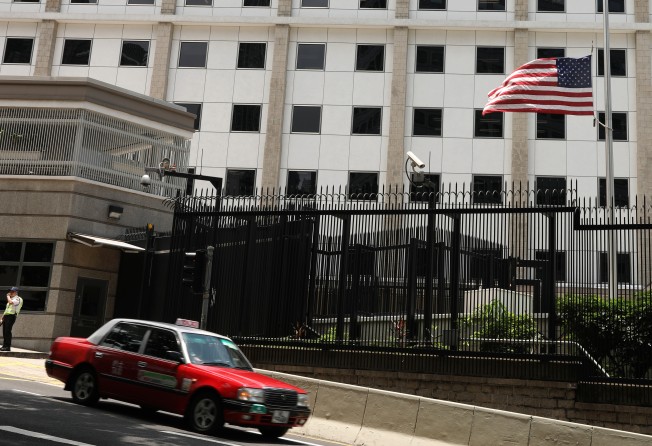National security law: US envoy to Hong Kong slams ‘terrible’ legislation, says consulate will still meet with opposition figures
- Accusations of US interference ‘an effort to distract attention from the real issue by blaming a foreign scapegoat’, says Consul General Hanscom Smith
- Beijing jurisdiction and creation of new security agency among problematic features of new law singled out by envoy

The United States consulate in Hong Kong will continue to interact with opposition politicians, even as the new national security law seeks to outlaw foreign interference in the city, its top envoy vowed on Thursday.
In an interview with the Post two days after the imposition of the Beijing-decreed law, US Consul General Hanscom Smith also voiced concerns about several areas of what he called a “terrible” law, including its extraterritoriality, which covers offences by non-permanent residents outside the city.
“It is terrible. What exactly does that mean?” Smith said, referring to the law’s long-arm jurisdiction. “It is a bad law that fundamentally erodes Hong Kong’s high degree of autonomy.”
Smith said false comparisons had been drawn by the bill’s supporters, who pointed to the US’ own national security laws. Observers have recently noted that some of the country’s criminal laws had extraterritorial application and targeted foreign individuals believed involved in terrorism.
“The point is not whether or not you have a national security law, but how it’s created and whether or not it reflects the will of Hong Kong people,” he said.
“This was imposed by Beijing in an opaque way. You have troubling and very unfortunate scenes of people here publicly supporting legislation that they have never laid eyes on.”
The controversial law Beijing tailor-made for Hong Kong – designed to prevent, stop and punish acts of secession, subversion, terrorism and collusion with foreign forces that endanger national security – was imposed against the backdrop of a souring Sino-US relationship marked by a series of tit-for-tat actions.
Washington had earlier imposed visa restrictions on Chinese officials and banned defence exports to Hong Kong over the new law, prompting Beijing to announce plans to retaliate with visa restrictions on US individuals.
Smith stopped short of revealing the next batch of planned sanctions on Thursday, saying they would be drafted by the White House.
But he gave a resounding “no” when asked if the US consulate would change the way it interacts with the city’s opposition politicians – or its operations in general – in light of the new legislation.
“We are diplomats … and we engage across the board,” he said. “Of course we don’t agree with everyone we meet, but when we meet with members of the pro-establishment [camp], is that collusion? Why should it be collusion when we meet with someone from the opposition?”

05:50
What you should know about China's new national security law for Hong Kong
He described the accusation of US interference – which he categorically denied – as “an effort to distract attention from the real issue by blaming a foreign scapegoat”.
“It is absurd to think an open exchange of ideas somehow is tantamount to collusion. It reveals the insecurity in Beijing,” he said.
Asked if people would now be discouraged from communicating with the consulate, Smith said the creation of “a chilling atmosphere of fear and self-censorship” would be one of the tragedies brought by the new legislation.
Hong Kong national security law official English version:
He also felt the same in regard to activists who had either fled the city or disbanded their political groups because of the law.
“The fact that some people feel this chill and feel coerced or threatened by the law is a terrible tragedy for Hong Kong,” he said.
He also noted specific provisions of the law he found problematic, in particular, Beijing’s right to assert jurisdiction over certain Hong Kong cases, the chief executive’s new power to designate judges, and the creation of a national security agency that will enjoy wide-ranging power.
In a statement issued on Thursday, the American Chamber of Commerce in the city said it would take time for the business community to digest details of the law, and called for more interaction with the local government to seek clarity on how the law would be interpreted and implemented.
Smith reiterated that any erosion of the city’s autonomy would affect its competitiveness.
“There is no such thing as ‘one country, two economic and financial systems’,” he said. “You cannot try to replace rule of law with rule by law and expect not to have an economic effect as well.”